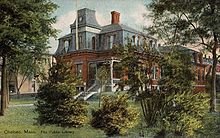Chelsea, Massachusetts
Chelsea is a city in Suffolk County, Massachusetts, United States, directly across the Mystic River from Boston.
[4] The area of Chelsea was first called Winnisimmet, possibly meaning "swamp hill",[5] by the Naumkeag tribe, which had lived there for thousands of years.
On March 19, 1846, North Chelsea, which consists of present-day Revere and Winthrop, was established as a separate town.
[6] Reincorporated as a city in 1857, Chelsea developed as an industrial center and by mid-century had become a powerhouse in wooden sailing ship construction.
Factories making rubber and elastic goods, boots and shoes, stoves, and adhesives began to appear along the banks of Boston Harbor.
[7] According to local historical records, Nathan Morse, the first Jewish resident of Chelsea, arrived in 1864, and by 1890, only 82 Jews were living in the city.
Fully transitioned from a suburb to an industrial city, the waterfront flourished, with shipbuilding, lumberyards, metalworks, and paint companies lining Marginal Street.
City Hall was eviscerated, the police and fire departments reorganized, management of the public schools given to Boston University, and indictments handed down.
[citation needed] Located on a small peninsula in Boston Harbor covering 2.21 square miles (6 km2), Chelsea is the smallest city by area in Massachusetts.
The topography of Chelsea consists primarily of coastal lowlands, punctuated by four drumlins formed during the last Ice Age.
There are several distinct neighborhoods in Chelsea: As of the 2010 United States Census,[15] there were 35,177 people, 11,888 households, and 7,614 families residing in the city.
In addition, 62.1% of residents identified as Hispanic or Latino (of any race), which includes 18.2% Salvadoran, 12.7% Puerto Rican, 8.4% Honduran, 7.3% Guatemalan, 2.8% Mexican, 2.2% Dominican, 0.5% Cuban, 0.5% Costa Rican, 0.4% Nicaraguan, 0.4% Panamanian, 1.4% other Central American countries, 2.5% other South American countries, 5.3% other Hispanic/Latino.
[20] Its "Interfaith Alliance" brings members of the Jewish, Christian, and Muslim communities together to promote inclusiveness, diversity, and tolerance.
Many of these programs are led and administered in conjunction with fellows from the Harvard Kennedy School's Innovation Field Lab.
The project has been supported by a newly hired Downtown Coordinator and aims to engage residents and local businesses in a collective effort to advance the economic prosperity and quality of life in the district.
Since the beginning of 2017 City officials kicked off Reimagining Broadway as a way to improve the downtown streets for motorists, pedestrians, and public transit.
[51] On July 23, 2019, the Baker-Polito Administration announced the expansion of the Transformative Development Initiative (TDI), a MassDevelopment program for Gateway Cities designed to accelerate economic growth within focused districts.
"Our administration is pleased to further expand this program, which represents an innovative, block-by-block approach to revitalizing local economies."
There are other similar projects like "Commonwealth Places", a collaborative initiative from MassDevelopment and the civic crowdfunding platform Patronicity, and "The Chelsea Business Foundation" are in progress and scheduled for spring/summer 2020.
[55][56][full citation needed] Housing Composition: According to the 2011–2015 Community Survey, there are a total of 12,940 households in Chelsea, 27.9% of which are owner-occupied and 72.1% of which are renter-occupied.
Over half (55.4%) of the housing units in Chelsea use utility gas, 29.8% use electricity, 12.7% use fuel oil, kerosene, etc.
The goals of this project were to "Enhance how public space is used and accessed downtown, support existing businesses and encourage new growth, beautify the area and create a consistent, vibrant look, improve overall safety for all users, establish a circulation pattern that works for cars, buses, pedestrians, transit riders, and bicyclists.
"[59][60] The Route 1 North Expressway is a limited access highway that cuts the City of Chelsea in half.
The Tobin Bridge, a major regional transportation artery, carries Route 1 from Chelsea across the Mystic River to Charlestown.
Chelsea is served by many MBTA bus routes providing local service to East Boston, Revere, Everett, and other nearby cities as well as bus rapid transit connections to Logan Airport and downtown Boston via the MBTA's Silver Line.
A new $20 million Chelsea commuter rail station and "transit hub" was constructed at the Mystic Mall terminus of the new Silver Line route, so that trains no longer block Sixth Street.
Located within the Box District neighborhood, the path connects Downtown Chelsea and Eastern Avenue stations.
Bunker Hill Community College and the for-profit Everest Institute have satellite locations of their schools in Chelsea.







